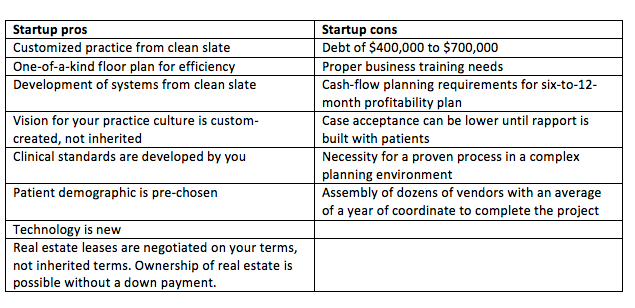Startup vs. acquisition: What’s your best option for practice ownership?
Doctors considering practice ownership are often faced with the complex choice between a startup practice or an acquisition.

Doctors considering practice ownership are often faced with the complex choice between a startup practice or an acquisition.
Most young dentists don’t want to remain associates for their entire career. They recognize the opportunity to create more control, income and independence through practice ownership. Rightfully, they see the opportunities for personal and professional satisfaction as unparalleled.
As we contrast startup practices and acquisitions, consider how these topics will better prepare you for an enjoyable and fulfilling career without the unnecessary mishaps of certain practice failures.
So, which option is better for today’s dentist: Startup or acquisition?
Trending article: How to navigate dental practice transitions
Startup practices: Opportunities and warnings
When starting a practice from scratch, doctors experience a once-in-a-lifetime process.
Each step is customized to meet your personal standards, vision, tastes and desires. From the location selection, to the development of proper protocol, to floorplan design, branding, marketing, team development and processes - all are built with the values and the personal touch of the owner.
By choosing and creating a customized clinical environment, doctors can have a business that represents them on a personal and professional level. It’s a fulfilling process of imagining a successful practice and then seeing it come to life on your own terms.
However, there are important warnings to consider.
Long gone are the days when a startup practice can expect success by haphazardly choosing a location and hanging a shingle. Fortunately, when a location is chosen with precise demographic data and proper real-estate negotiations, the right location will help propel a practice to tremendous growth in its first year.
The complications of PPOs, demographics, taxation and business systems all make following the proper planning stages more impactful than ever before for startups. In recent years, competition from larger practices has created geographies of high concern that should not be considered for startup practices.
- With hundreds of variables that must be factored, six key elements for startups are:
- Proper analyses of current-day demographics studies
- Floorplan layout alignment with your clinical standards, not equipment sales
- Real estate selection that is functional for a private practice
- Negotiations in equipment and construction that consider national pricing
- Banking and profitability planning with a business plan customized for your vision
- Tested marketing and hiring processes to grow quickly
Trending article: The importance of patient acquisition in a competitive market
Wayne Gretzky, arguably the best professional hockey player in history, said much of his success was due to his uncanny ability to “anticipate where the puck is going.”
Proper planning with all the key factors allows you to forecast and “anticipate” growth, like the Gretzky of dentistry. Forecasting in this way puts startups in a category by themselves.
In other words, startup practices, when planned properly, can experience growth that is smooth and predictable.
Floorplan design is also a unique experience for startup practices owners. Floorplans, when created well, significantly increase productivity. Acquisitions may trap you in a practice designed in the days of film dip tanks. Startups, however, benefit from one-of-a-kind custom designs that help your practice stand out among competitors. Floorplans also affect practice efficiency with all the modern advances in technology, practice flow patterns and custom ergonomic preferences. As an added benefit to startups, “line of sight” spacial planning concepts and creative design touches can be used to highlight your personal values.
Office protocol and systems are also designed from the ground-up in startups. This concept of smooth running office systems is of high interest to doctors who are turned off by changing dysfunctional, deeply ingrained processes found in some older practices.
Trending article: The top 10 mistakes dental practices make
What about profitability?
Many doctors express concern about reaching profitability with a startup. With a full, legitimate business plan that incorporates precise demographics, staffing plans, business protocol and financial projections, many startup practices reach profitability within their first six to nine months.
The biggest regret of startup practice owners is the failure to follow proven planning stages, leading to drastically higher costs and much lower profits.

Next: The value and risks of practice acquisitions
Acquisitions: The hidden values and risks
Alternatively, acquisitions can create success by allowing for the purchase of an existing patient base, systems, staff and equipment all at once. Ideally, you can acquire a practice that you can own, run and profit from, beginning on your first day of ownership. When the right practice is acquired the right way, this is possible.
However, it is important to point out two deeply misunderstood concepts in acquisitions.
1. Buying a practice is very different from buying a successful practice. In other words, ownership should not be your goal. Buying a practice that will be successful is the goal. A proper, outside analysis will reveal this. Don’t settle for an acquisition for the sake of being a practice owner. Doctors who make that mistake regret it for many years.
2. Acquisitions should not be assumed to be “low risk”. Many young doctors incorrectly believe acquisitions are inherently low risk. Nothing could be further from the truth, no matter what any vendor in the process tells you. Thorough analyses from unbiased parties should always be the top priority in this process. It is recommended to avoid the interactions with and opinions from the seller or the seller’s broker. Those who take this lightly often find themselves trapped with very expensive, very messy surprises.
Trending article: How DSOs can enhance your practice
Some of the surprises that buyers find out after the purchase has gone through are:
- Large volume of patient loss: You should expect at least 10-20 percent
- Staff turnover: You can expect at least one key employee to leave
- Unplanned repair costs: Remember, older equipment is costlier to repair
- Poor business systems: An older practice run on old systems is harder to transition to newer systems and technology
- Undesirable patient habits: What levels of case acceptance exist?
- High-dollar costs to improve the facility: Will there be construction needed, does the clinical portion of the practice need to updated?
- Problems with landlords: Are the terms of the lease protecting you?
Any of these surprises can be devastating financially and emotionally. And many doctors find themselves in need of a part-time associate position to afford the costs of loan payments, though they were told their acquisition was low risk. Doctors should be trained and adequately prepared on the skill of practice acquisition well before beginning their search. Doing so will help avoid these common surprises. But far too few young doctors are properly educated on the costly and high-stake world of practice acquisitions.
Acquisitions can be wonderful and profitable. Ownership can happen almost immediately and growth will occur if planned properly. An important piece of early growth hinges on the transition from seller to buyer taking place smoothly. But acquisitions are also a costly process with a level of inherent risk that many buyers wish they had taken more seriously prior to closing.
Trending article: The right way to bring on an associate in your dental practice

We would like to point out that, “regardless of the type of practice ownership you chose, having creative control over how you want to practice is a game changer. Rightly so, practice ownership is a major motivator for young entrepreneurial dentists.”
The ability to build a relationship based practice versus the typical transaction based practice is something that the big-box dental corporations cannot compete with.
Most practice owners would agree that practice ownership was the best choice of their career, granting them freedom and control with both clinical and personal rewards.
When done properly, both startups and acquisitions can lead young doctors to transform into more confident, bold and accomplished individuals. Owning a practice that represents your clinical standards creates pride of ownership and fulfillment unlike any other part of dentistry.
Get a free copy of the “Startups vs, Acquisitions” video and audio course at www.idealpractices.com/owners.